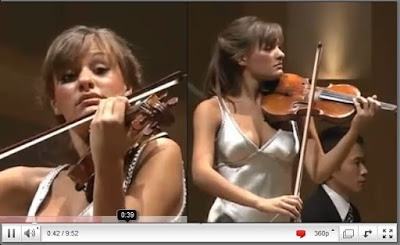 it's always a treat to experience new talent, and especially a young musician with the ability and temperament to perform the less-often performed repertoire as was the case tonight -- it was thrilling!
it's always a treat to experience new talent, and especially a young musician with the ability and temperament to perform the less-often performed repertoire as was the case tonight -- it was thrilling!Before that, however, the PSO again performed 'Tambor' (drum) composed and introduced this evening by Joan Tower. The subject of the piece centered around percussion and rhythm. As she described, there were 3 aspects:
1) percussion as a backdrop, the drums as an eyeline to the orchestra with short repetitions coming behind, sort of an edge, then with the solo violin (performed by Andrés Cárdenes), 3 triangles acted as an icy backdrop.
2) a counterpoint and
3) percussion solos
It was all wrapped up into a sort of flowing music that I like to compare to the analogy given by Leonard Berstein as the kind of music which is hard to write, and would make a great backdrop for a movie score, and has to be so good that you don't even realize it's even there, yet without it, the whole would not seem complete (I'm paraphrasing from memory). I don't know if Ms. Tower intended this same sort of impression when writing this music, but that's the imagery that came to mind when I heard this action packed journey, which seemed somewhat similar to the other composition I heard last Fall, 'Sequoia', yet different in the actual use of percussion as the color.
Next, Nicola Benedetti entered the stage and began the first of the two pieces she would perform: Poeme for Violin and Orchestra by Ernest Chausson. This piece in particular seemed extremely challenging -- one of those kind of compositions which sound fabulous, with the violin and orchestra combined, giving a general feeling and atmosphere of a beautifully combined expression. There most certainly must have been expressive, rhythmical poetry intended by the composer and certainly the performance by Ms Benedetti was riveting and was synchronised well by Yan Pascal Tortelier, yet I wondered how the musicians themselves must have thought of the performance.
With the the next selection I believe my wondering thoughts were answered. During the performance of the Tzigane for Violin and Orchestra by Maurice Ravel, on several occasions during some of the most difficult yet intriguing parts I observed Ms. Benedetti beaming with a smile not yet seen before while performing. It was contagious, I smiled too, I believe the whole audience did too. It was a growing wave of joyful feeling of bliss as if all her insecurities had been set free, as if she had portrayed the music with just the exact kind of interpretation she had intended, and it seemed to spread as that same wave over the audience as an exquisite ethereal statement of harmony between soloist, orchestra, conductor and audience which culminated in a kind of rapture which erupted into an instant standing of ovation from the audience, and the empyrean finale of a singular performance.
At intermission she signed autographs. I got two myself :) What was really interesting was that she was sitting in orchestra row L center, not far from where I was sitting, and observing a fantastic performance of Firebird by the PSO for the second half - an artist in the audience.
Here are some quotes from last fall from Nicola Benedetti...
Plays a violin called the "Earl Spencer Stradivarius (c. 1712)" which she characterized in this interview as "an incredible instrument with a never ending capacity for sound and colors - as really developing yourself through the instrument.
 It changes a lot with different temperatures and different humidity, it's a very sort of temperamental instrument - it also reacts very strongly to bow and different kinds of hair, so its a very sensitive instrument, but you can't really get such beauty without the sensitivity, so it kind of goes hand in hand. I think most people that play strads say somewhat similar things, I think they do anyway."
It changes a lot with different temperatures and different humidity, it's a very sort of temperamental instrument - it also reacts very strongly to bow and different kinds of hair, so its a very sensitive instrument, but you can't really get such beauty without the sensitivity, so it kind of goes hand in hand. I think most people that play strads say somewhat similar things, I think they do anyway."On Fan Appreciation: "Signing CDs after concerts is always one of the only chances you get to speak to your audience and to really feel and understand and hear what they felt about what you've just done, and quite often it's so enormously different than what you yourself felt. Quite often this things if you felt somewhat uncomfortable or if you have some insecurities. actually speaking to people and hearing how much they feel the music and how much they focus on the general impressions of the concert and how much the feel the piece of music as opposed to necessarily how you've interpreted the piece of music, then that's what really carries. I think it's always a sort of comforting and an important thing to do, it gives you a chance to be much closer to them."





No comments:
Post a Comment